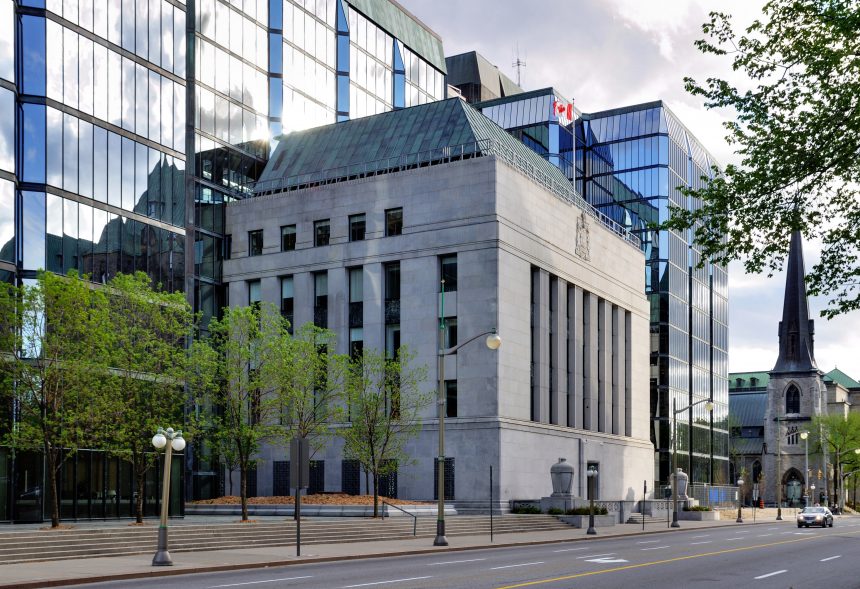Bank of Canada raises interest rate to 22-year high amid concerns over persistent inflation.
After a prolonged pause since January, the Bank of Canada (BoC) made a significant move by increasing its overnight rate to 4.75 percent, the highest level in 22 years. Experts and market analysts promptly predicted another rate hike in the upcoming month as a measure to cool down an overheating economy grappling with stubbornly high inflation.

Since March 2022, the central bank had raised borrowing costs eight times, leading to a 15-year high of 4.5 percent—a record-breaking tightening cycle. The decision to hold off on further rate adjustments since January was intended to evaluate the impact of previous hikes.
However, the BoC’s recent statement highlighted surprising strength in consumer spending, a rebound in service demand, increased housing activity, and a tight labor market. These factors indicated that excess demand in the economy persisted more than anticipated, leading to concerns about inflation remaining substantially above the 2% target.
With an uptick in April’s inflation figures and persistently high core inflation measures, the central bank concluded that the existing monetary policy was insufficiently restrictive to restore balance between supply and demand, and to sustainably bring inflation back to the 2% target.
Looking ahead, money markets have already priced in further tightening measures, with a probability of over 60% for another rate hike in July. The sentiment is strongly echoed by Derek Holt, vice president of capital markets economics at Scotiabank, who compared the situation to opening a bag of chips—once you start, it’s hard to stop.
The last time the interest rate reached 4.75 percent was in April and May of 2001. While the BoC did not schedule a press conference for the rate hike announcement, Deputy Governor Paul Beaudry will address the media and answer questions in British Columbia on Thursday.

Economic future: crisis looms or smooth transition ahead?
Political Clash: Opposition Leader Blames Trudeau for Financial Crisis, Finance Minister Optimistic about Soft Landing
Tensions rise as Pierre Poilievre, leader of Canada’s main opposition Conservative Party, addresses his parliamentary caucus and accuses Liberal Prime Minister Justin Trudeau of fueling inflation through deficit spending, pushing the country towards a looming financial crisis.
Contrarily, Canada’s Finance Minister, Chrystia Freeland, attributes rising prices to the economic recovery from the COVID-19 pandemic and the recent conflict involving Russia’s invasion of Ukraine. She expresses confidence that Canada is well-positioned for a smooth transition, stating that the country is nearing the end of this challenging period and expects a return to low and stable inflation along with strong, steady growth.
While money markets and analysts had anticipated a potential interest rate increase, many believed it was more likely to occur at the next meeting in July. Approximately two-thirds of economists surveyed by Reuters predicted that the central bank would maintain interest rates until the end of 2023.
April witnessed a noteworthy acceleration in annual inflation, reaching 4.4 percent after a 10-month period of slower growth. The first quarter experienced a gross domestic product (GDP) rise of 3.1 percent, surpassing the Bank of Canada’s forecast of 2.3 percent. The economy is projected to expand by 0.2 percent in April.
Andrew Kelvin, Chief Canada Strategist at TD Securities, acknowledges the Canadian economy’s resilience in 2023 and anticipates another rate hike in July. He believes that additional tightening is necessary to lower demand and achieve the central bank’s 2 percent inflation target.
The Bank of Canada notes its commitment to monitoring economic indicators to determine their alignment with achieving the inflation target. However, the central bank eliminates language from the previous policy statement that expressed a willingness to raise the policy rate further, leaving its next course of action more open-ended.
While the Bank of Canada expects inflation to slow to 3 percent in the summer, it refrains from reiterating its previous forecast that inflation would gradually reach its 2 percent target by the end of next year, as stated in its April projections.
SOURCE: REUTERS


